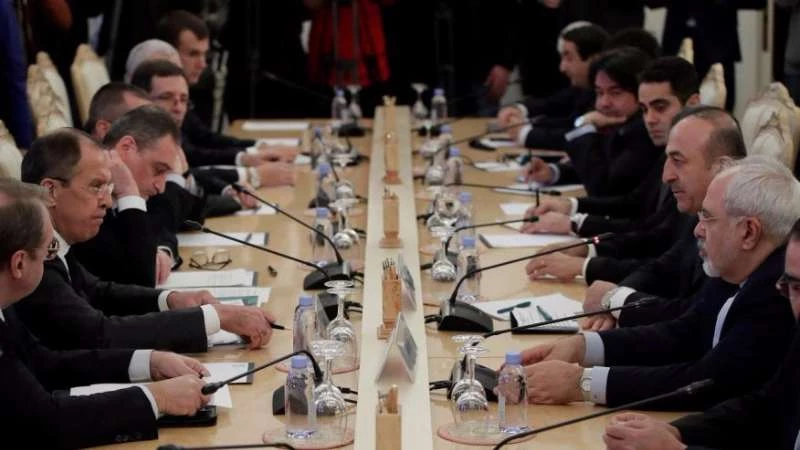It is mind-boggling that an international conference was held on Syria, without Syrian or any Arab representation. Following the destruction of Aleppo, this meeting has the feeling of a “victors’ conference” — the main objective being to belittle and marginalize other parties.
Russia and Iran did not even consider the Assad regime worthy of participation. Bashar Assad has gone from being a junior partner, wholly dependent on Iranian benevolence, to being an irrelevance. After years of insisting that Assad was irreplaceable, what Iran was really demanding was a leader so weak and beholden that Syria would henceforth be ruled directly from Tehran.
Also notably excluded was any Western stakeholder. US President Barack Obama proved himself to be a disinterested and disengaged interlocutor. We in the Arab world have always been deeply ambivalent about American regional hegemony but the sudden surrender of the “global policemen” role did not enhance regional sovereignty; rather it allowed predatory second-rate “superpowers” to try their luck.
Yet we may come to miss Obama: The nearest thing US President-elect Donald Trump and his hawkish and ignorant appointees have to a foreign policy is provoking the Chinese and cozying up to Putin. Trump’s tweets responding to European terrorist attacks show a man unable to distinguish between Arabs, Muslims and extremists. His tweets, which threaten to trigger a nuclear arms race, are yet more terrifying. Perhaps the best we can hope is that he forgets this part of the world exists at all.
Europe has gone from being a sophisticated counterweight to US foreign policy efforts to introverted obsession with its own crises. I have often disagreed with British foreign policy, but at least the Foreign Office could claim to be a center of expertise. My more recent visits indicate an institution which struggles to perceive a role for itself within the region’s complex dynamics.
Through such inconsistent and disconnected policies, the West has succeeded in erasing its own relevance. I feel intense embarrassment for the UN Security Council every time Syrians and others ask me what role this global body is playing and why it has not acted. How best to explain an international system which has become so completely dysfunctional that its humanitarian operations came to rely on the goodwill of Assad in being granted access to large areas of Syria?
Most disturbing of all is the degree to which the Arab world has been excluded from efforts to address the conflict. It should not be necessary for me to explain why a central Arab role is essential. This Arab state with a Sunni Arab majority population needs a likeminded party on the global stage that is committed to its interests. Even Turkey has demonstrated that its strategic priority extends little beyond neutralizing Kurdish aspirations.
It has never been more vital to have a definitive Arab position on Syria, but it has never seemed more unachievable. Tehran neutralized Iraq while the Maghreb states are consumed with their own affairs.
Furthermore, a wedge has been driven between the Saudi-Egyptian positions. King Salman’s Cairo visit in early 2016 raised hopes for a coherent Arab approach. However, Cairo’s desire to open channels of dialogue with Hezbollah, Iran and Russia seems to have conflicted with the prospect of Egypt’s standing foursquare with the GCC on regional security. This is a tragedy: When Saudi Arabia and Egypt are not united, there is no Arab world!
When I grew up in Lebanon — regardless of what we thought of the Assad regime — we looked to Syria as a major powerbroker. Syria was not the richest Arab nation; neither was it the largest or most populous. Syria did not have the biggest army. But Syria mattered.
In part, this is because of Syria’s strategic geographic location as the beating heart of the Levant. At a time when Egypt and Jordan were moving toward conciliation; Syria was the Arab world’s strategic bridgehead against Israel.
Syria is not some poor marginal state. When we lose Syria, the Arab world loses its right arm.
This is why we cannot allow Iran, Turkey and Russia to sit in Moscow — like some latter-day Sykes-Picot — and carve up Syria among themselves; particularly after Iraq and Lebanon have been nearly annexed from the Arab nation.
The exclusion of the Arab voice over Syria is not incidental or accidental; it is calculated to de-Arabize core Arab states. This is precisely why we must hitherto insist that there cannot be a word of discussion about Syria’s future without a central Arab role. This is not a matter of protocol or saving face: The only party with an automatic right, alongside the Syrian people themselves, to deciding the fate of Syria, is the Arab world. The fact that this truth even needs saying is a sign of the weak position of the Arab world in recent decades.
The initiative by Russia and Iran to hold a summit in which the Syrians and Arabs were excluded is as much an act of hostility as an assault on Aleppo using Afghan, Iranian, Iraqi and Pakistani militias. This is no less a violation of Syrian-Arab sovereignty than the first Sykes-Picot agreement in which junior French and British officials got together in a smoky room and used a ruler to draw lines across Arab lands and nations of which they were ignorant.
The fact that such conferences are happening should serve as a wake-up call. We failed to take decisive action to prevent the loss of Iraq. Lebanon seems to be going the same way. The dismemberment of the Arab world is already at an advanced stage.
We must draw a line in the sand — before someone else does it for us.
Baria Alamuddin (Arab News)



التعليقات (0)